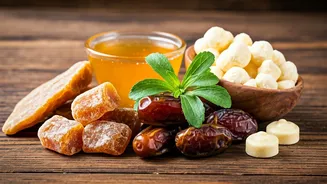Sweeteners Explained
Suman Agarwal, a nutritionist, offers insights into the world of sweeteners. She clarifies that while jaggery and honey do provide some advantages, they
aren't calorie-free. Dates, on the other hand, are a worthy choice when consumed in moderation. The article also touches upon the safer alternatives such as zero-calorie stevia and monk fruit, which are preferable to artificial sweeteners. The essential takeaway is the significance of reducing all added sugars, including the seemingly healthier ones, as recommended by the World Health Organization and supported by scientific studies. This approach is key to achieving and maintaining long-term health and well-being.
Jaggery and Honey
Jaggery and honey are often considered healthier substitutes for refined sugar, but it's important to understand their place in a balanced diet. Jaggery, a traditional Indian sweetener, offers some nutritional benefits but still contributes calories. Honey, also revered for its natural origin, is similarly not calorie-free. Both of these sweeteners should be used with awareness of their caloric content, and should be consumed in moderation, to avoid any adverse health implications. It is crucial to remember that both are still forms of sugar. The nutritional value should always be considered when making dietary choices, and it's best to consult a healthcare expert to determine the best options.
The Date's Dilemma
Dates offer a viable alternative when considering sweeteners, because they have a unique nutritional profile. Rich in fiber and essential nutrients, dates can be part of a well-rounded diet. However, despite their nutritional benefits, dates are still a source of sugar and calories. Agarwal suggests that the key to integrating dates into your diet is through mindful consumption. Enjoying them in moderation ensures that you can benefit from their nutrients without exceeding your daily calorie or sugar intake. This balanced approach allows you to satisfy your sweet cravings while maintaining a healthy lifestyle, offering a delicious option for those looking to swap out more processed sugars.
Zero-Calorie Wonders
Stevia and monk fruit, the zero-calorie alternatives, are presented as safer choices compared to artificial sweeteners. They allow for the enjoyment of sweetness without the associated caloric load. Stevia, derived from the stevia plant, and monk fruit, from the monk fruit plant, both offer a naturally derived sweetness. These alternatives have become increasingly popular for people looking to control their sugar intake and manage their weight. By choosing these sweeteners, people can reduce their added sugar consumption. However, it's always advisable to consume any sweetener in moderation and always in combination with a balanced diet and regular exercise routine.
The Bottom Line
Ultimately, the consensus among experts, including the World Health Organization, highlights the importance of limiting all added sugars. This holds true even for sweeteners that are considered to be healthier than refined sugar. Whether you choose jaggery, honey, dates, or a zero-calorie alternative, the underlying goal should be to reduce the overall consumption of added sugars in your diet. This approach contributes to better health, including helping with weight management and minimizing the risk of various health issues. It is important to stay informed about different sweeteners and to consult with a nutritionist or healthcare professional to make choices that align with your individual health goals.













